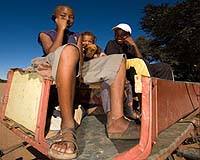| . |  |
. |
New York NY (SPX) Mar 31, 2011 When the world's biggest retail company, US-based Walmart, bought a majority stake in South Africa's Massmart - also a retail company - for a staggering $2.5 billion last year, eyebrows were raised. Foreign investors in Africa usually put their money in the riches that lie beneath its soil, not over its discount counters. In fact, the steady growth of foreign direct investment (FDI) to the continent during most of the past decade has been mostly concentrated in mining, especially oil. Yet, much like Walmart, a growing number of investors are betting on the continent's ultimate wealth - Africans themselves - a report by the UN Conference on Trade and Development (UNCTAD) reveals. And for all the shock that Walmart's foray into African retailing initially prompted, it still fell well short of the $10.7 billion sale of Kuwaiti telecommunications company Zain's African assets to Bharti, an Indian competitor, a few months earlier. Overall, the UNCTAD report notes, amidst a recent slump in FDI flows to Africa caused by the global 2008 financial crisis, "The services sector, led by the telecommunications industry, became the dominant FDI recipient." Across the continent, new deals involving major foreign corporations are becoming a common occurrence in industries previously considered unattractive. Nestle, the Swiss food giant, has announced plans to spend $1 billion by 2013 for acquisitions in various African countries, including the Democratic Republic of the Congo, Nigeria and Angola. Less than two years ago, Nestle's main competitor, France's Danone, took full ownership of South Africa's leader in fresh cultured dairy products, Clover. Investments in African infrastructure, services and retail sales, development experts note, could have a very positive impact on African economies. Unlike extractive industries, they say, growth in consumer-oriented sectors often lead to the creation of many more jobs and stimulate domestic spending.
Benefits of growth A much-talked about report by McKinsey, a US consulting firm, estimates that the continent is home to around 50 million middle-class households (defined as those with incomes of at least $20,000), as many as in India. One in every 10 Africans, says a study by the French aid agency, is already a "solvent consumer" - those who can afford the latest smart phones, the newest computers and dinners at trendy restaurants. The rise of this middle class is linked to the strong economic performances recorded in many African countries since the end of the 1990s. Average economic growth has been around 5 per cent a year, while average inflation rates declined to 8 per cent from an earlier high of 22 per cent. From 2000 to 2010, six of the world's 10 fastest-growing economies were in sub-Saharan Africa, reports The Economist, an authoritative London weekly. In fact, the publication argues that Africa is the site of "the surprising success story of the past decade," high praise from a magazine that is generally not very enthusiastic about the continent. Strong growth - and not only in the oil-rich countries that have benefited from booming demand from emerging economies - enabled millions of people to move up the financial ladder. And while growth in oil-producing countries usually did not create many new jobs, growth in many others did, spurring consumer demand and boosting domestic spending. In South Africa, Tunisia, Egypt and Morocco, Africa's four most advanced and diversified economies, domestic consumption has been the largest contributor to growth in recent years.
Policies, peace and governance NEPAD "did help shape a new, more positive perception of Africa," argues Patrick Osakwe, an economist with the UN Economic Commission for Africa (ECA) and co-author of a study on FDI to Africa. By emphasizing the importance of good governance, Mr. Osakwe told Africa Renewal, the plan has fuelled a momentous shift in the way the rest of the world sees the continent.
Expanding prosperity Such promising prospects are central to Walmart's expansion plans in Africa and other Western investors are likely to follow. With the continent's combined consumer spending forecast to reach $1,400 billion by 2020, up from just $860 billion in 2008, companies from China, India and Brazil are also expanding operations in the region. As foreign investors rush to benefit from the arrival of upscale African consumers, however, prosperity still remains elusive for too many others. "To expand prosperity, African leaders need to invest in infrastructure and education, to diversify their economies, so that many more people can benefit from growth," argues ECA's Mr. Osakwe. Western investors seem to think Africa is off to a good start.
Share This Article With Planet Earth
Related Links UNCTAD Africa News - Resources, Health, Food
 Africa turns to cellphones for better health
Africa turns to cellphones for better healthJohannesburg (AFP) March 30, 2011 The text message arrives with life-saving discretion: a neutral "see you at the clinic tomorrow" to remind patients to pick up a fresh batch of anti-AIDS drugs. The free texts from South Africa's largest HIV treatment site are part of a push in Africa to boost health by targeting the continent's 624 million mobile phone subscribers. "I check my cellphone all the time - I think that's wh ... read more |
|
| The content herein, unless otherwise known to be public domain, are Copyright 1995-2010 - SpaceDaily. AFP and UPI Wire Stories are copyright Agence France-Presse and United Press International. ESA Portal Reports are copyright European Space Agency. All NASA sourced material is public domain. Additional copyrights may apply in whole or part to other bona fide parties. Advertising does not imply endorsement,agreement or approval of any opinions, statements or information provided by SpaceDaily on any Web page published or hosted by SpaceDaily. Privacy Statement |